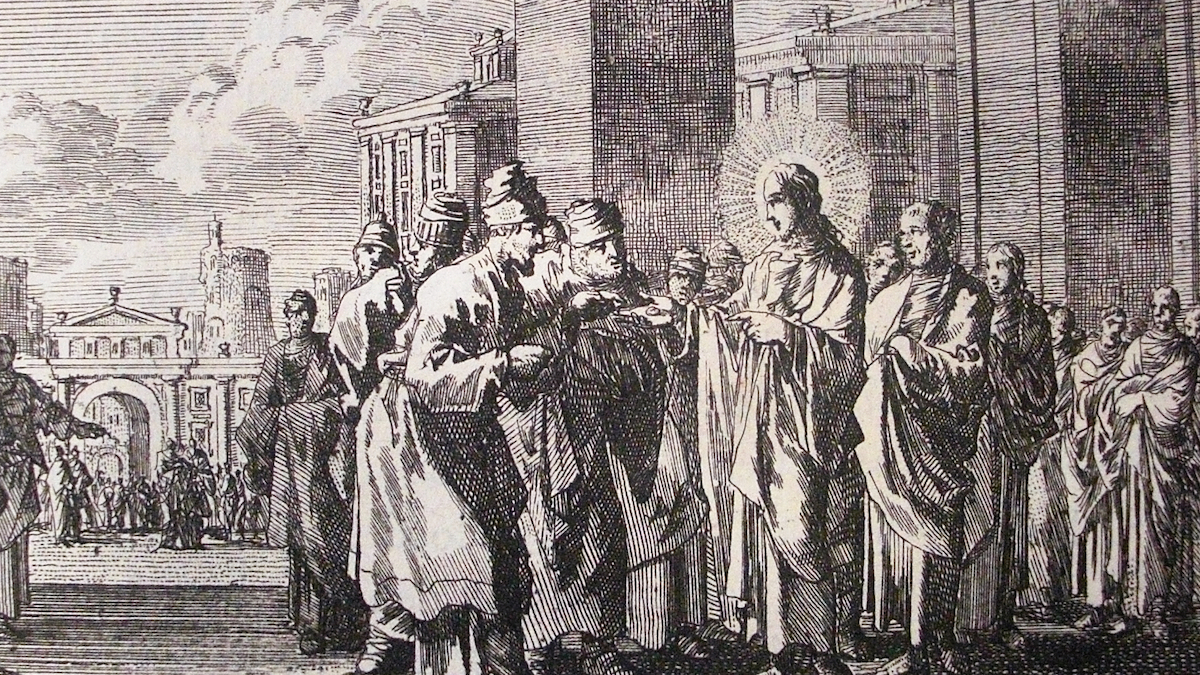Once upon a time, in a kingdom known for its peace and prosperity, everyone was happy and friendly. There was little crime there, and the few people who broke the law were punished quickly and severely. One day a poor man stole a loaf of bread to feed his family, but was caught and taken before the king, who pronounced a harsh sentence: he would be hanged in front in front of the entire royal court. When asked if he had any last words, the thief responded, “Your majesty, I can plant a rare and valuable apple seed in the ground and have it grow overnight and become a tree that bears wonderful fruit. It’s a secret my father taught me, and it would be a shame for it to die with me.”
Intrigued by this claim, the king demanded a demonstration, so the thief dug a small hole and took a seed from his pocket, but then said, “This seed can only be successfully planted by someone who has never stolen even the smallest thing—so, of course, I cannot plant it; you must choose someone else to do so.” The king asked his prime minister to take the seed and plant it, but he hesitated, and with some embarrassment responded, “Your majesty, I recall that when I was young, I took something that didn’t belong to me—so I’m unable to plant the seed.” The king next asked the royal treasurer, then each of his royal advisors, his military officers and guards, and finally all the gentlemen and ladies of the royal court—but each of them remembered some small act of stealing or theft at some point in life, and thus politely refused the king’s request. No one—including the king himself—wanted to be embarrassed by planting the seed and then be revealed as less than completely honest when the seed fail to grow overnight. Seeing this, the thief addressed the royal court, “You are all mighty and powerful persons and are in need of nothing, yet you cannot plant the seed—but here I am, a poor man who merely stole a loaf of bread to feed my family, and for that I am to be hanged?” While everyone else looked away in shame and confusion, the king—moved by these words and not wanting to be thought a hypocrite—pardoned the thief and even praised him for his simple wisdom (Paul J. Wharton, Stories and Parables for Preachers and Teachers, p. 56). None of us can claim to be free of all sin, and so we must be careful not to judge the sins of others. Jesus always welcomed repentant sinners with great love and mercy—and if we want to be part of His Kingdom, we must imitate His example.
No one ever gets away with hypocrisy for the simple reason that God is able to look into our hearts. St. Paul tells us to be firm, steadfast, and devoted to doing the work of the Lord—and this requires us to be humble and honest in our thoughts, words, and deeds. Also, the Book of Sirach tells us that sooner or later everyone’s true character is revealed. And, in the Gospel of Luke (6:39-45), Jesus warns us of the danger of considering ourselves better than others. Even if we blind ourselves to God’s truth, we will nevertheless be judged on this basis.
An older woman was listening to the TV while folding laundry one afternoon, and heard a special report about a car driving in the wrong direction on a local freeway. Knowing her often-distracted husband was probably traveling that very same road after completing some errands, she called his cell phone to warn him, “Dear, be please careful—there’s a car on that road going in the wrong direction.” However, to her distress he shouted in response, “It isn’t just one car; they’re all driving the wrong way!”
It’s very easy for us to assume we’re right and that everyone else is wrong—but how often is that really the case? I can recall a time at another parish when after Mass an angry parishioner loudly denounced me for something I had said about the Church’s teaching—yet I was unquestionably 100% in the right, and he was completely wrong. Yet I can also remember times when I was absolutely convinced I remembered something correctly—usually something fairly unimportant, like a sports event—and yet it turned out I was mistaken. None of us have perfect memories; none of us are immune or exempt from making mistakes, and none of us are so holy that we are perfectly capable of rightly judging the innocence or guilt of others—and so we must be extremely careful, and extremely humble, in this regard.
Many of the saints offer us valuable advice on this matter. For instance, the 7th century monk and abbot John Climacus warns, “To pass judgment on another is to usurp shamelessly a prerogative of God, and to condemn [another] is to ruin one’s own soul.” He further says, “Do not condemn, even with your eyes, for they are often deceived.” According to the great bishop St. Alphonsus Liguori, “We should all stop scowling at the sins of other people. Rather, we should consider that we may be worse spiritually than they are and should say, ‘Lord, if You had not helped me, I should have done worse.” St. Francis de Sales advises us that if we’re tempted to judge someone, we should first ask ourselves if we would want him or her to judge us using those same standards—and if not, that’s a sign that we need to repent. Because of our weak and sinful human nature, our judgments are often mistaken. That’s why, according to St. Therese of Lisieux, the Little Flower, “There’ll be a lot of surprises at the Last Judgment when we shall be able to see what really happened inside people’s souls. . . .” Finally, St. Teresa of Calcutta, or Mother Teresa, teaches: “If you judge people, you have no time to love them.”
Loving others is what it’s all about; that’s how we become true disciples of Jesus, and avoid hypocrisy in our dealings with other people, and produce the good fruit Our Lord speaks of in the Gospel. Yes, there may be times when we have to disagree with or even correct others in regard to their behavior and beliefs—but we must always do so in a spirit of charity and humility, and only after silently asking the Holy Spirit to give us the right words to say. Love builds up, but pride tears down; humility opens the door to divine grace, but self-righteousness slams it shut. Let us seek after God’s glory, not our own—for only in this way can we be sure we are truly following in the footsteps of Jesus.








